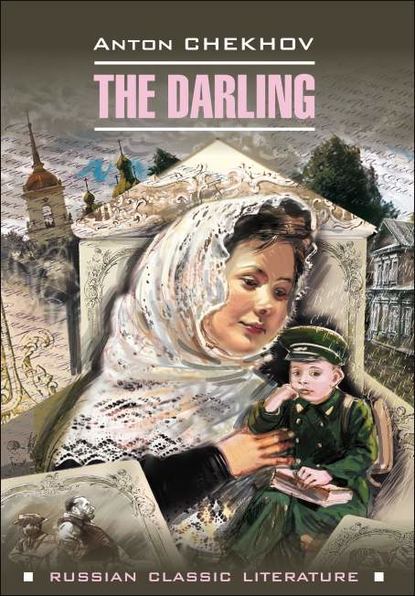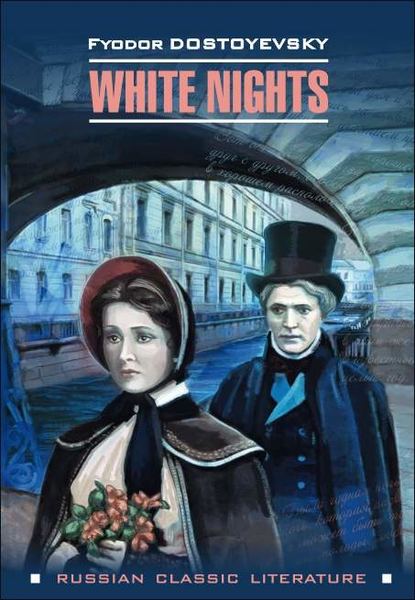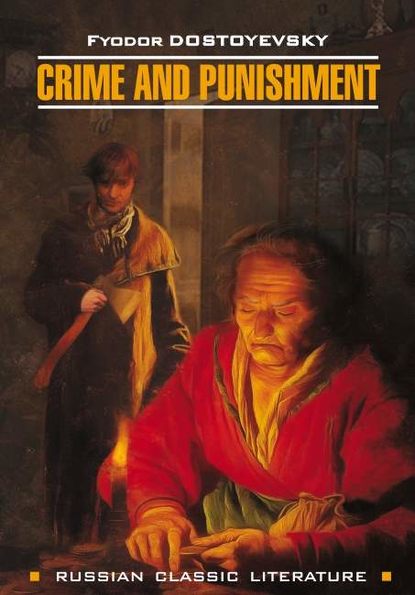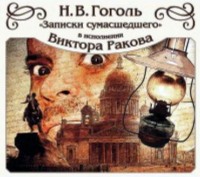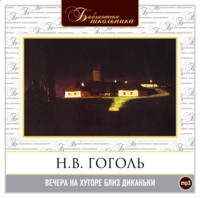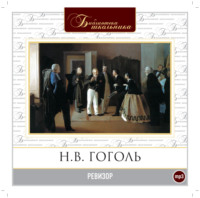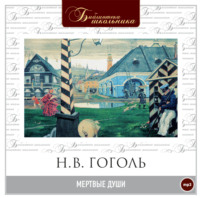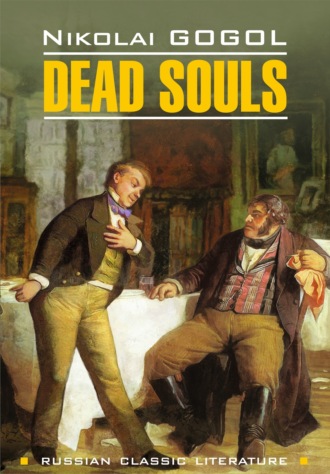
Полная версия
Мёртвые души / Dead Souls
But let me confess that I always shrink from saying too much about ladies. Moreover, it is time that we returned to our heroes, who, during the past few minutes, have been standing in front of the drawing-room door, and engaged in urging one another to enter first.
“Pray be so good as not to inconvenience yourself on my account,” said Chichikov. “I will follow YOU.”
“No, Paul Ivanovitch – no! You are my guest.” And Manilov pointed towards the doorway.
“Make no difficulty about it, I pray,” urged Chichikov. “I beg of you to make no difficulty about it, but to pass into the room.”
“Pardon me, I will not. Never could I allow so distinguished and so welcome a guest as yourself to take second place.”
“Why call me ‘distinguished,’ my dear sir? I beg of you to proceed.”
“Nay; be YOU pleased to do so.”
“And why?”
“For the reason which I have stated.” And Manilov smiled his very pleasantest smile.
Finally the pair entered simultaneously and sideways; with the result that they jostled one another not a little in the process.
“Allow me to present to you my wife,” continued Manilov. “My dear – Paul Ivanovitch.”
Upon that Chichikov caught sight of a lady whom hitherto he had overlooked, but who, with Manilov, was now bowing to him in the doorway. Not wholly of unpleasing exterior, she was dressed in a well-fitting, high-necked morning dress of pale-coloured silk; and as the visitor entered the room her small white hands threw something upon the table and clutched her embroidered skirt before rising from the sofa where she had been seated. Not without a sense of pleasure did Chichikov take her hand as, lisping a little, she declared that she and her husband were equally gratified by his coming, and that, of late, not a day had passed without her husband recalling him to mind.
“Yes,” affirmed Manilov; “and every day SHE has said to ME: ‘Why does not your friend put in an appearance?’ ‘Wait a little dearest,’ I have always replied. ‘’Twill not be long now before he comes.’ And you HAVE come, you HAVE honoured us with a visit, you HAVE bestowed upon us a treat – a treat destined to convert this day into a gala day, a true birthday of the heart.”
The intimation that matters had reached the point of the occasion being destined to constitute a “true birthday of the heart” caused Chichikov to become a little confused; wherefore he made modest reply that, as a matter of fact, he was neither of distinguished origin nor distinguished rank.
“Ah, you ARE so,” interrupted Manilov with his fixed and engaging smile. “You are all that, and more.”
“How like you our town?” queried Madame. “Have you spent an agreeable time in it?”
“Very,” replied Chichikov. “The town is an exceedingly nice one, and I have greatly enjoyed its hospitable society.”
“And what do you think of our Governor?”
“Yes; IS he not a most engaging and dignified personage?” added Manilov.
“He is all that,” assented Chichikov. “Indeed, he is a man worthy of the greatest respect. And how thoroughly he performs his duty according to his lights! Would that we had more like him!”
“And the tactfulness with which he greets every one!” added Manilov, smiling, and half-closing his eyes, like a cat which is being tickled behind the ears.
“Quite so,” assented Chichikov. “He is a man of the most eminent civility and approachableness. And what an artist! Never should I have thought he could have worked the marvellous household samplers which he has done! Some specimens of his needlework which he showed me could not well have been surpassed by any lady in the land!”
“And the Vice-Governor, too – he is a nice man, is he not?” inquired Manilov with renewed blinkings of the eyes.
“Who? The Vice-Governor? Yes, a most worthy fellow!” replied Chichikov.
“And what of the Chief of Police? Is it not a fact that he too is in the highest degree agreeable?”
“Very agreeable indeed. And what a clever, well-read individual! With him and the Public Prosecutor and the President of the Local Council I played whist until the cocks uttered their last morning crow. He is a most excellent fellow.”
“And what of his wife?” queried Madame Manilov. “Is she not a most gracious personality?”
“One of the best among my limited acquaintance,” agreed Chichikov.
Nor were the President of the Local Council and the Postmaster overlooked; until the company had run through the whole list of urban officials. And in every case those officials appeared to be persons of the highest possible merit.
“Do you devote your time entirely to your estate?” asked Chichikov, in his turn.
“Well, most of it,” replied Manilov; “though also we pay occasional visits to the town, in order that we may mingle with a little well-bred society. One grows a trifle rusty if one lives for ever in retirement.”
“Quite so,” agreed Chichikov.
“Yes, quite so,” capped Manilov. “At the same time, it would be a different matter if the neighbourhood were a GOOD one – if, for example, one had a friend with whom one could discuss manners and polite deportment, or engage in some branch of science, and so stimulate one’s wits. For that sort of thing gives one’s intellect an airing. It, it – ” At a loss for further words, he ended by remarking that his feelings were apt to carry him away; after which he continued with a gesture: “What I mean is that, were that sort of thing possible, I, for one, could find the country and an isolated life possessed of great attractions. But, as matters stand, such a thing is NOT possible. All that I can manage to do is, occasionally, to read a little of A Son of the Fatherland.”
With these sentiments Chichikov expressed entire agreement: adding that nothing could be more delightful than to lead a solitary life in which there should be comprised only the sweet contemplation of nature and the intermittent perusal of a book.
“Nay, but even THAT were worth nothing had not one a friend with whom to share one’s life,” remarked Manilov.
“True, true,” agreed Chichikov. “Without a friend, what are all the treasures in the world? ‘Possess not money,’ a wise man has said, ‘but rather good friends to whom to turn in case of need.’”
“Yes, Paul Ivanovitch,” said Manilov with a glance not merely sweet, but positively luscious – a glance akin to the mixture which even clever physicians have to render palatable before they can induce a hesitant patient to take it. “Consequently you may imagine what happiness – what PERFECT happiness, so to speak – the present occasion has brought me, seeing that I am permitted to converse with you and to enjoy your conversation.”
“But WHAT of my conversation?” replied Chichikov. “I am an insignificant individual, and, beyond that, nothing.”
“Oh, Paul Ivanovitch!” cried the other. “Permit me to be frank, and to say that I would give half my property to possess even a PORTION of the talents which you possess.”
“On the contrary, I should consider it the highest honour in the world if —”
The lengths to which this mutual outpouring of soul would have proceeded had not a servant entered to announce luncheon must remain a mystery.
“I humbly invite you to join us at table,” said Manilov. “Also, you will pardon us for the fact that we cannot provide a banquet such as is to be obtained in our metropolitan cities? We partake of simple fare, according to Russian custom – we confine ourselves to shtchi, but we do so with a single heart. Come, I humbly beg of you.”
After another contest for the honour of yielding precedence, Chichikov succeeded in making his way (in zigzag fashion) to the dining-room, where they found awaiting them a couple of youngsters. These were Manilov’s sons, and boys of the age which admits of their presence at table, but necessitates the continued use of high chairs. Beside them was their tutor, who bowed politely and smiled; after which the hostess took her seat before her soup plate, and the guest of honour found himself esconsed between her and the master of the house, while the servant tied up the boys’ necks in bibs.
“What charming children!” said Chichikov as he gazed at the pair. “And how old are they?”
“The eldest is eight,” replied Manilov, “and the younger one attained the age of six yesterday.”
“Themistocleus,” went on the father, turning to his first-born, who was engaged in striving to free his chin from the bib with which the footman had encircled it. On hearing this distinctly Greek name (to which, for some unknown reason, Manilov always appended the termination “eus”), Chichikov raised his eyebrows a little, but hastened, the next moment, to restore his face to a more befitting expression.
“Themistocleus,” repeated the father, “tell me which is the finest city in France.”
Upon this the tutor concentrated his attention upon Themistocleus, and appeared to be trying hard to catch his eye. Only when Themistocleus had muttered “Paris” did the preceptor grow calmer, and nod his head.
“And which is the finest city in Russia?” continued Manilov.
Again the tutor’s attitude became wholly one of concentration.
“St. Petersburg,” replied Themistocleus.
“And what other city?”
“Moscow,” responded the boy.
“Clever little dear!” burst out Chichikov, turning with an air of surprise to the father. “Indeed, I feel bound to say that the child evinces the greatest possible potentialities.”
“You do not know him fully,” replied the delighted Manilov. “The amount of sharpness which he possesses is extraordinary. Our younger one, Alkid, is not so quick; whereas his brother – well, no matter what he may happen upon (whether upon a cowbug or upon a water-beetle or upon anything else), his little eyes begin jumping out of his head, and he runs to catch the thing, and to inspect it. For HIM I am reserving a diplomatic post. Themistocleus,” added the father, again turning to his son, “do you wish to become an ambassador?”
“Yes, I do,” replied Themistocleus, chewing a piece of bread and wagging his head from side to side.
At this moment the lacquey who had been standing behind the future ambassador wiped the latter’s nose; and well it was that he did so, since otherwise an inelegant and superfluous drop would have been added to the soup. After that the conversation turned upon the joys of a quiet life – though occasionally it was interrupted by remarks from the hostess on the subject of acting and actors. Meanwhile the tutor kept his eyes fixed upon the speakers’ faces; and whenever he noticed that they were on the point of laughing he at once opened his mouth, and laughed with enthusiasm. Probably he was a man of grateful heart who wished to repay his employers for the good treatment which he had received. Once, however, his features assumed a look of grimness as, fixing his eyes upon his vis-a-vis, the boys, he tapped sternly upon the table. This happened at a juncture when Themistocleus had bitten Alkid on the ear, and the said Alkid, with frowning eyes and open mouth, was preparing himself to sob in piteous fashion; until, recognising that for such a proceeding he might possibly be deprived of his plate, he hastened to restore his mouth to its original expression, and fell tearfully to gnawing a mutton bone – the grease from which had soon covered his cheeks.
Every now and again the hostess would turn to Chichikov with the words, “You are eating nothing – you have indeed taken little;” but invariably her guest replied: “Thank you, I have had more than enough. A pleasant conversation is worth all the dishes in the world.”
At length the company rose from table. Manilov was in high spirits, and, laying his hand upon his guest’s shoulder, was on the point of conducting him to the drawing-room, when suddenly Chichikov intimated to him, with a meaning look, that he wished to speak to him on a very important matter.
“That being so,” said Manilov, “allow me to invite you into my study.” And he led the way to a small room which faced the blue of the forest. “This is my sanctum,” he added.
“What a pleasant apartment!” remarked Chichikov as he eyed it carefully. And, indeed, the room did not lack a certain attractiveness. The walls were painted a sort of blueish-grey colour, and the furniture consisted of four chairs, a settee, and a table – the latter of which bore a few sheets of writing-paper and the book of which I have before had occasion to speak. But the most prominent feature of the room was tobacco, which appeared in many different guises – in packets, in a tobacco jar, and in a loose heap strewn about the table. Likewise, both window sills were studded with little heaps of ash, arranged, not without artifice, in rows of more or less tidiness. Clearly smoking afforded the master of the house a frequent means of passing the time.
“Permit me to offer you a seat on this settee,” said Manilov. “Here you will be quieter than you would be in the drawing-room.”
“But I should prefer to sit upon this chair.”
“I cannot allow that,” objected the smiling Manilov. “The settee is specially reserved for my guests. Whether you choose or no, upon it you MUST sit.”
Accordingly Chichikov obeyed.
“And also let me hand you a pipe.”
“No, I never smoke,” answered Chichikov civilly, and with an assumed air of regret.
“And why?” inquired Manilov – equally civilly, but with a regret that was wholly genuine.
“Because I fear that I have never quite formed the habit, owing to my having heard that a pipe exercises a desiccating effect upon the system.”
“Then allow me to tell you that that is mere prejudice. Nay, I would even go so far as to say that to smoke a pipe is a healthier practice than to take snuff. Among its members our regiment numbered a lieutenant – a most excellent, well-educated fellow – who was simply INCAPABLE of removing his pipe from his mouth, whether at table or (pardon me) in other places. He is now forty, yet no man could enjoy better health than he has always done.”
Chichikov replied that such cases were common, since nature comprised many things which even the finest intellect could not compass.
“But allow me to put to you a question,” he went on in a tone in which there was a strange – or, at all events, RATHER a strange – note. For some unknown reason, also, he glanced over his shoulder. For some equally unknown reason, Manilov glanced over HIS.
“How long is it,” inquired the guest, “since you last rendered a census return?”
“Oh, a long, long time. In fact, I cannot remember when it was.”
“And since then have many of your serfs died?”
“I do not know. To ascertain that I should need to ask my bailiff. Footman, go and call the bailiff. I think he will be at home to-day.”
Before long the bailiff made his appearance. He was a man of under forty, clean-shaven, clad in a smock, and evidently used to a quiet life, seeing that his face was of that puffy fullness, and the skin encircling his slit-like eyes was of that sallow tint, which shows that the owner of those features is well acquainted with a feather bed. In a trice it could be seen that he had played his part in life as all such bailiffs do – that, originally a young serf of elementary education, he had married some Agashka of a housekeeper or a mistress’s favourite, and then himself become housekeeper, and, subsequently, bailiff; after which he had proceeded according to the rules of his tribe – that is to say, he had consorted with and stood in with the more well-to-do serfs on the estate, and added the poorer ones to the list of forced payers of obrok, while himself leaving his bed at nine o’clock in the morning, and, when the samovar had been brought, drinking his tea at leisure.
“Look here, my good man,” said Manilov. “How many of our serfs have died since the last census revision?”
“How many of them have died? Why, a great many.” The bailiff hiccoughed, and slapped his mouth lightly after doing so.
“Yes, I imagined that to be the case,” corroborated Manilov. “In fact, a VERY great many serfs have died.” He turned to Chichikov and repeated the words.
“How many, for instance?” asked Chichikov.
“Yes; how many?” re-echoed Manilov.
“HOW many?” re-echoed the bailiff. “Well, no one knows the exact number, for no one has kept any account.”
“Quite so,” remarked Manilov. “I supposed the death-rate to have been high, but was ignorant of its precise extent.”
“Then would you be so good as to have it computed for me?” said Chichikov. “And also to have a detailed list of the deaths made out?”
“Yes, I will – a detailed list,” agreed Manilov.
“Very well.”
The bailiff departed.
“For what purpose do you want it?” inquired Manilov when the bailiff had gone.
The question seemed to embarrass the guest, for in Chichikov’s face there dawned a sort of tense expression, and it reddened as though its owner were striving to express something not easy to put into words. True enough, Manilov was now destined to hear such strange and unexpected things as never before had greeted human ears.
“You ask me,” said Chichikov, “for what purpose I want the list. Well, my purpose in wanting it is this – that I desire to purchase a few peasants.” And he broke off in a gulp.
“But may I ask HOW you desire to purchase those peasants?” asked Manilov. “With land, or merely as souls for transferment – that is to say, by themselves, and without any land?”
“I want the peasants themselves only,” replied Chichikov. “And I want dead ones at that.”
“What? – Excuse me, but I am a trifle deaf. Really, your words sound most strange!”
“All that I am proposing to do,” replied Chichikov, “is to purchase the dead peasants who, at the last census, were returned by you as alive.”
Manilov dropped his pipe on the floor, and sat gaping. Yes, the two friends who had just been discussing the joys of camaraderie sat staring at one another like the portraits which, of old, used to hang on opposite sides of a mirror. At length Manilov picked up his pipe, and, while doing so, glanced covertly at Chichikov to see whether there was any trace of a smile to be detected on his lips – whether, in short, he was joking. But nothing of the sort could be discerned. On the contrary, Chichikov’s face looked graver than usual. Next, Manilov wondered whether, for some unknown reason, his guest had lost his wits; wherefore he spent some time in gazing at him with anxious intentness. But the guest’s eyes seemed clear – they contained no spark of the wild, restless fire which is apt to wander in the eyes of madmen. All was as it should be. Consequently, in spite of Manilov’s cogitations, he could think of nothing better to do than to sit letting a stream of tobacco smoke escape from his mouth.
“So,” continued Chichikov, “what I desire to know is whether you are willing to hand over to me – to resign – these actually non-living, but legally living, peasants; or whether you have any better proposal to make?”
Manilov felt too confused and confounded to do aught but continue staring at his interlocutor.
“I think that you are disturbing yourself unnecessarily,” was Chichikov’s next remark.
“I? Oh no! Not at all!” stammered Manilov. “Only – pardon me – I do not quite comprehend you. You see, never has it fallen to my lot to acquire the brilliant polish which is, so to speak, manifest in your every movement. Nor have I ever been able to attain the art of expressing myself well. Consequently, although there is a possibility that in the – er – utterances which have just fallen from your lips there may lie something else concealed, it may equally be that – er – you have been pleased so to express yourself for the sake of the beauty of the terms wherein that expression found shape?”
“Oh, no,” asserted Chichikov. “I mean what I say and no more. My reference to such of your pleasant souls as are dead was intended to be taken literally.”
Manilov still felt at a loss – though he was conscious that he MUST do something, he MUST propound some question. But what question? The devil alone knew! In the end he merely expelled some more tobacco smoke – this time from his nostrils as well as from his mouth.
“So,” went on Chichikov, “if no obstacle stands in the way, we might as well proceed to the completion of the purchase.”
“What? Of the purchase of the dead souls?”
“Of the ‘dead’ souls? Oh dear no! Let us write them down as LIVING ones, seeing that that is how they figure in the census returns. Never do I permit myself to step outside the civil law, great though has been the harm which that rule has wrought me in my career. In my eyes an obligation is a sacred thing. In the presence of the law I am dumb.”
These last words reassured Manilov not a little: yet still the meaning of the affair remained to him a mystery. By way of answer, he fell to sucking at his pipe with such vehemence that at length the pipe began to gurgle like a bassoon. It was as though he had been seeking of it inspiration in the present unheard-of juncture. But the pipe only gurgled, et praeterea nihil.
“Perhaps you feel doubtful about the proposal?” said Chichikov.
“Not at all,” replied Manilov. “But you will, I know, excuse me if I say (and I say it out of no spirit of prejudice, nor yet as criticising yourself in any way) – you will, I know, excuse me if I say that possibly this – er – this, er, SCHEME of yours, this – er – TRANSACTION of yours, may fail altogether to accord with the Civil Statutes and Provisions of the Realm?”
And Manilov, with a slight gesture of the head, looked meaningly into Chichikov’s face, while displaying in his every feature, including his closely-compressed lips, such an expression of profundity as never before was seen on any human countenance – unless on that of some particularly sapient Minister of State who is debating some particularly abstruse problem.
Nevertheless Chichikov rejoined that the kind of scheme or transaction which he had adumbrated in no way clashed with the Civil Statutes and Provisions of Russia; to which he added that the Treasury would even BENEFIT by the enterprise, seeing it would draw therefrom the usual legal percentage.
“What, then, do you propose?” asked Manilov.
“I propose only what is above-board, and nothing else.”
“Then, that being so, it is another matter, and I have nothing to urge against it,” said Manilov, apparently reassured to the full.
“Very well,” remarked Chichikov. “Then we need only to agree as to the price.”
“As to the price?” began Manilov, and then stopped. Presently he went on: “Surely you cannot suppose me capable of taking money for souls which, in one sense at least, have completed their existence? Seeing that this fantastic whim of yours (if I may so call it?) has seized upon you to the extent that it has, I, on my side, shall be ready to surrender to you those souls UNCONDITIONALLY, and to charge myself with the whole expenses of the sale.”
I should be greatly to blame if I were to omit that, as soon as Manilov had pronounced these words, the face of his guest became replete with satisfaction. Indeed, grave and prudent a man though Chichikov was, he had much ado to refrain from executing a leap that would have done credit to a goat (an animal which, as we all know, finds itself moved to such exertions only during moments of the most ecstatic joy). Nevertheless the guest did at least execute such a convulsive shuffle that the material with which the cushions of the chair were covered came apart, and Manilov gazed at him with some misgiving. Finally Chichikov’s gratitude led him to plunge into a stream of acknowledgement of a vehemence which caused his host to grow confused, to blush, to shake his head in deprecation, and to end by declaring that the concession was nothing, and that, his one desire being to manifest the dictates of his heart and the psychic magnetism which his friend exercised, he, in short, looked upon the dead souls as so much worthless rubbish.
“Not at all,” replied Chichikov, pressing his hand; after which he heaved a profound sigh. Indeed, he seemed in the right mood for outpourings of the heart, for he continued – not without a ring of emotion in his tone: “If you but knew the service which you have rendered to an apparently insignificant individual who is devoid both of family and kindred! For what have I not suffered in my time – I, a drifting barque amid the tempestuous billows of life? What harryings, what persecutions, have I not known? Of what grief have I not tasted? And why? Simply because I have ever kept the truth in view, because ever I have preserved inviolate an unsullied conscience, because ever I have stretched out a helping hand to the defenceless widow and the hapless orphan!” After which outpouring Chichikov pulled out his handkerchief, and wiped away a brimming tear.


